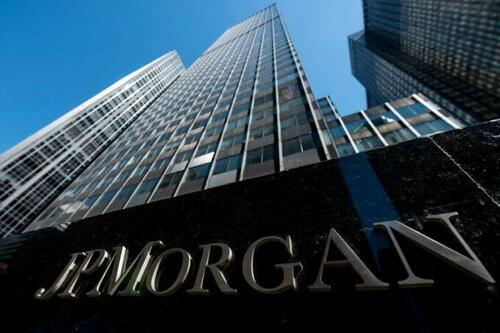
German lawmakers have called it the "greatest tax heist" in history: the loophole in the tax law of Germany, Denmark, and the UK to pocket hundreds of millions of euros, if not billions, via a trading strategy known as "Cum-Ex" - or "With-Without."
In the past, we have noted Deutsche Bank, Morgan Stanley, Barclays Plc, and Bank of America Corp.'s Merrill Lynch's Frankfurt offices were raided as part of a money laundering probe.
This week, JPMorgan Chase & Co.'s Frankfurt office was raided as part of a widening Cum-Ex scandal centered on cross-border tax fraud.
"A spokesman for Cologne prosecutors on Wednesday said searches at an unidentified bank started on Tuesday and included the homes of four suspects and an auditing firm that isn't a target in the probe. More than 50 officers are involved, including specialists, to unearth evidence buried in emails," Bloomberg reported Wednesday morning.
JPMorgan confirmed to Reuters that their "Frankfurt offices were visited this week" by "German authorities on their ongoing investigation" in the share-trading scheme that cost taxpayers billions of euros.
Cum-Ex reportedly diverted "at least 10 billion euros" in government revenue by exploiting German tax laws that allowed multiple investors to claim refunds of a tax on dividends that were paid only once, Bloomberg reported.
For those who aren't familiar with Cum-Ex, here's a quick rundown showing how it works, courtesy of the Conversation:
Party One, typically an asset manager who owns valuable company shares, "lends" its stock to Party Two, a bank. Under the agreement, the title and ownership of the stock is temporarily transferred to the borrower in return for a fee. Such practices are not only legal but a common part of "short selling," the practice featured in the 2015 film The Big Short. Essentially, it is where an investor borrows a stock (for a fee), sells it, then buys it back later at a lower price to return it to the original – on the expectation the stock's value will fall and a profit made.
Party Two then sells the shares with-dividend to Party Three fractionally before the Record Date. However, the shares are delivered without-dividend just after.
Timing, speed and complexity are key. Like a magic trick, the shares "disappear" fractionally before the Record Date and "reappear" with a new owner just after. The aim is to obscure exactly who – Party One, Two or Three – owns the stock on the Record Date. As a result, two parties can simultaneously claim ownership of the one stock.
Up until 2011, a loophole in the German tax code allowed both Party One (the owner of the original stock who had received the dividend and paid tax on it) and Party Three (the holder of the stock just after the Record Date) to claim a tax reimbursement. All colluding parties would then split the gains.
The practice was abolished in 2012, but prosecutors in Cologne are probing about 1,500 people and increasing pressure on international banks.
German lawmakers have called it the “greatest tax heist” in history: the loophole in the tax law of Germany, Denmark, and the UK to pocket hundreds of millions of euros, if not billions, via a trading strategy known as “Cum-Ex” – or “With-Without.”
In the past, we have noted Deutsche Bank, Morgan Stanley, Barclays Plc, and Bank of America Corp.’s Merrill Lynch’s Frankfurt offices were raided as part of a money laundering probe.
This week, JPMorgan Chase & Co.’s Frankfurt office was raided as part of a widening Cum-Ex scandal centered on cross-border tax fraud.
“A spokesman for Cologne prosecutors on Wednesday said searches at an unidentified bank started on Tuesday and included the homes of four suspects and an auditing firm that isn’t a target in the probe. More than 50 officers are involved, including specialists, to unearth evidence buried in emails,” Bloomberg reported Wednesday morning.
JPMorgan confirmed to Reuters that their “Frankfurt offices were visited this week” by “German authorities on their ongoing investigation” in the share-trading scheme that cost taxpayers billions of euros.
Cum-Ex reportedly diverted “at least 10 billion euros” in government revenue by exploiting German tax laws that allowed multiple investors to claim refunds of a tax on dividends that were paid only once, Bloomberg reported.
For those who aren’t familiar with Cum-Ex, here’s a quick rundown showing how it works, courtesy of the Conversation:
Party One, typically an asset manager who owns valuable company shares, “lends” its stock to Party Two, a bank. Under the agreement, the title and ownership of the stock is temporarily transferred to the borrower in return for a fee. Such practices are not only legal but a common part of “short selling,” the practice featured in the 2015 film The Big Short. Essentially, it is where an investor borrows a stock (for a fee), sells it, then buys it back later at a lower price to return it to the original – on the expectation the stock’s value will fall and a profit made.
Party Two then sells the shares with-dividend to Party Three fractionally before the Record Date. However, the shares are delivered without-dividend just after.
Timing, speed and complexity are key. Like a magic trick, the shares “disappear” fractionally before the Record Date and “reappear” with a new owner just after. The aim is to obscure exactly who – Party One, Two or Three – owns the stock on the Record Date. As a result, two parties can simultaneously claim ownership of the one stock.
Up until 2011, a loophole in the German tax code allowed both Party One (the owner of the original stock who had received the dividend and paid tax on it) and Party Three (the holder of the stock just after the Record Date) to claim a tax reimbursement. All colluding parties would then split the gains.
The practice was abolished in 2012, but prosecutors in Cologne are probing about 1,500 people and increasing pressure on international banks.







